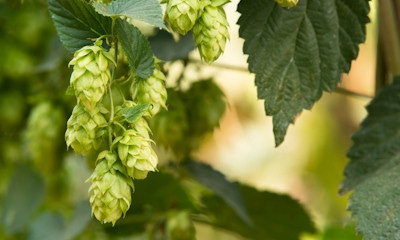April 20, 2016

When the news broke that science had found the compound in red wine - resveratrol - that might boost cardiovascular health, consumption of the adult beverage rose. News about a compound in hops offers even better news, but before you go bulk up on beer - listen to the whole story.

HOP TO IT: A flavonoid compound found in hops may hold the key toward treating cardiovascular disease and preventing type 2 diabetes. You can't drink enough beer to get the right does. (Photo: aaron007/ThinkstockPhotos)
A recent study at Oregon State University identified specific intake levels of xanthohumol that improved a range of underlying markets of metabolic syndrome in lab animals, and reduced weight gain. Xanthohumol is a natural flavonoid found in hops and the findings were published in a special issue of Archives of Biochemistry and Biophysics focused on polyphenols and health. The work suggests a possible new approach to issues including human obesity, high cholesterol and elevated glucose.
The combination of those three problems - obesity, cholesterol and glucose - are known collectively as metabolic syndrome and are linked to major health issues and causes of death in the developed world. The two key diseases - cardiovascular disease and type 2 diabetes.
In the research, lab mice were fed a high-fat diet, and given varying levels of the hop-derived flavonoid. In the study when compared to animals given none of the supplement, the highest dosage of xanthohumol given to lab animals cut their low-density lipoprotein (the bad cholesterol) levels 80%; insulin levels fell 42%; and their IL-6 biomarker for inflammation fell 78%. Inflammation is a growing area of interest in cardiovascular health.
Because they were still growing, eating a rich diet, gaining weight and becoming obese, the weight of the lab animals increased, but by 22% less in those receiving xanthohumol, even though all animals ate the same amount of food. Intake of xanthohumol appears to increase their oxygen consumption and metabolic rate, with implications for weight control.
"This is the first time we've seen one compound with the potential to address so many health problems," said Cristobal Miranda, a research assistant professor with OSU's Linus Pauling Institute and lead author on this study. "These were very dramatic improvements."
More research will be required to show safety and efficacy in humans, the researchers said. However, the researchers note that they have been feeding high doses of xanthohumol 15 to 30 times higher than used so far and there have been no apparent problems. Researchers say, that this product may prove an effective treatment for metabolic syndrome at a very low cost.
But before you start loading up on beer as a way to get to xanthohumol produced from hops, the researchers issue this caution. The highest level used in the research trial was 60 milligrams per kilogram of body weight. This would be about 350 milligrams per day for a145-pound person. That's a lot more than you could get drinking beer, and researchers note to get that level from beer directly you would need to consume 3,500 pints of beer per day for a human adult. While that may sound fun, it makes more sense to wait for xanthohumol refined as a human dietary supplement that could be taken once a day.
Source: Oregon State University
You May Also Like




